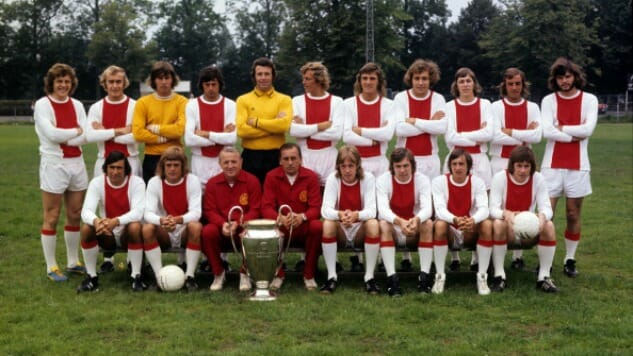The 20 Greatest Ever Soccer Teams
Photo by VI-Images/Getty
As with our recent features on the all-time greatest managers and players, the task of determining the best-ever soccer teams wasn’t an easy one. On which factors do you base the results on? Their trophy haul? Style of play? Quality of players? Impact on future generations? Well, we eventually settled on a mixture of all four. Concentrating solely on domestic clubs—which is why you won’t see the likes of Pele’s Brazil or 1970s West Germany included—and their greatest era, here’s our Top 20. Let the heated debate begin.
20. River Plate (1941-47)

It took a national players’ strike to prevent the unstoppable River Plate from becoming an even more dominant force in the immediate post-war era. Nicknamed La Máquina (The Machine) due to their innovative five-man attack, the likes of José Manuel Moreno, Félix Loustau and all-time top scorer Ángel Labruna bulldozed their way through the defences of Argentina’s Primera División, winning three league titles in six years in the process. Had the Copa Libertadores existed back then, they would have undoubtedly conquered the rest of South America as well.
19. Nottingham Forest (1977-1980)

Leicester City’s recent achievements in the billion-dollar franchise that is the Premier League may be regarded as greater than Nottingham Forest’s triumph in the less glamorous First Division of the 1970s. But Brian Clough’s men followed up their unlikely one-season rise from promotion to champions with not just one but two European Cups. Alongside their famous victories over Malmö and Hamburg, the likes of Peter Shilton, John Robertson and Tony Woodcock also lifted the League Cup, European Super Cup and Community Shield in perhaps the most remarkable rags-to-riches story in English soccer history.
18. Dynamo Kyiv (1985-87)

One of three great teams Dynamo Kyiv teams built by revolutionary coach Valeriy Lobanovskyi over a 20-year period, his mid-1980s side makes it here for the masterful way they executed his highly scientific plans. Using the kind of minute-by-minute data techniques that would later become widespread in the game, Lobanovskyi unarguably changed soccer tactics forever. But it was the likes of the club’s record scorer Oleg Blokhin and his highly-trained teammates who proved it could work outside the confines of the Soviet leagues. Just watch the end-to-end second goal during their ruthless 3-0 demolition of Atlético Madrid in the 1986 Cup Winners’ Cup final for proof of how dry stats can lead to beautiful soccer.
17. Preston North End (1888-89)

Preston North End’s spell as the first ever Invincibles was short-lived, but they merit their place here for the way in which they shook the foundations of the sport. The Lilywhites were not only one of the first clubs to look outside their hometown for players, they were also the first to reward their men with an actual pay packet. With an innovative pass-and-move style, PNE also won the inaugural Football League, scoring 59 goals in just 22 games in the process, and lifted the FA Cup without conceding a goal. The team’s hard-partying lifestyle, several serious illnesses and the jailing of chairman Billy Sudell for embezzling cut this triumphant reign short. But they still made more of an impact in a single season than many clubs do in their entire lifetimes.
16. Borussia Mönchengladbach (1970-79)

Borussia Mönchengladbach gained promotion to the newly-formed Bundesliga in the same year as Bayern Munich, kickstarting a rivalry which would push both sides to the top of the German game. Mönchenglandbach may not have possessed many star names—in fact five of their regulars hailed from within a ten-mile radius of the small town—but they more than matched Bayern in terms of domestic achievements. Indeed, they ended the 1970s with five league titles, including the first ever successful defence, and three on the bounce, as well as a DFB-Pokal. Unlike Bayern, European Cup success eluded them, although they did make it to a final and won two UEFA Cups with a gloriously daring style which even made their goal-hungry arch-rivals look defensive in comparison.
-

-

-

-

-

-

-

-

-

-

-

-

-

-

-

-

-

-

-

-

-

-

-

-

-

-

-

-

-

-

-

-

-

-

-

-

-

-

-

-























































